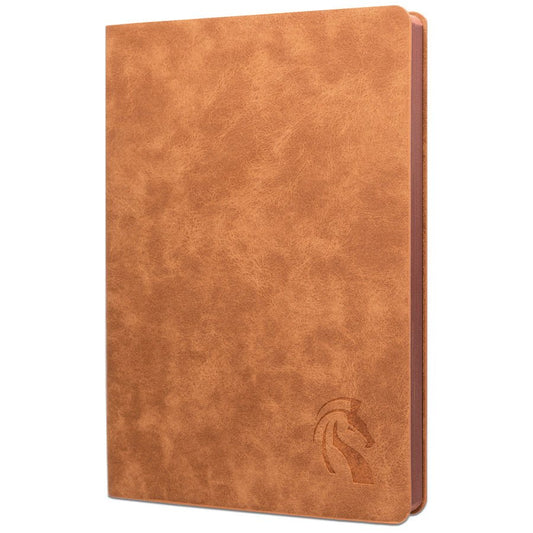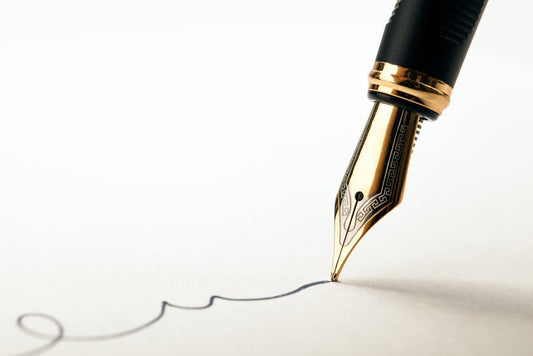
Lack of sleep has far more serious consequences than most people give it credit for. A lack of sleep can have negative effects on your mental and physical well-being, in addition to making you feel tired.
The benefits of journaling on sleep have been well documented, from establishing a digital detox before bed, to providing you with a space to plan for the future. Keep reading to learn the five most significant advantages of keeping a sleep journal.
Exactly What Is a Sleep Journal?
The concept of keeping a "sleep journal" may raise some questions. Journaling your feelings, thoughts, and activities right before bed is a simple definition of sleep journaling. Sleep journaling is different from keeping a sleep diary, bedtime journal, or dream journal, despite their similarities in name.
Keeping a sleep diary is a common practice for people interested in monitoring their sleep patterns, whether that be the times they go to bed and wake up or the total number of hours they spend asleep. Dreams can have significant meanings, and keeping track of them in a dream journal can help you decipher them.
Maintaining a sleep journal may help you get better sleep. Keeping a journal in the hours leading up to bedtime can be helpful for your mental health and wellbeing because it allows you to process your thoughts from the day before you try to sleep. Overthinking about future obligations or problems is a common cause of sleeplessness. Lack of sleep affects both your mind and body, so staying up late can make you sluggish and sleepy the next day.
Keeping a sleep journal means writing about your own unique experiences, so the entries will be highly personal and unique to you. Writing in a journal before bed can improve your health, mood, and outlook, as well as your productivity and contentment. Let’s look at the benefits of keeping a sleep journal.
1.Keeping a sleep journal is a great way to get stress off your chest.

Going to bed anxious is never a good omen for a night of restful sleep. A relaxed state of mind is essential for quality sleep. You won't have much time to relax if you spend it ruminating on the happenings of the day.
An advantage of keeping a journal before bed is that it provides an outlet for releasing your stress and anxiety. It's your own personal sanctuary, where you can write about anything that interests you.
2. Keeping a sleep diary improves your mental health, according to research.
Lack of sleep is directly related to psychological distress. These two issues can form a Catch-22 situation. You are unable to sleep because of your mental illness, but getting a good night's rest is essential to improving your mental health.
Journaling about your sleep habits can improve your mental health and make it easier to wind down for the night. Expressing yourself emotionally and creatively through freewriting can be very beneficial. You can gain confidence and strength as a result of facing your fears head-on.
Keeping a sleep journal can help you get out of a funk by improving your emotional and psychological well-being. The secret to a good night's sleep may lie in carving out some time in your journal to write about your thoughts and feelings.
3. keeping a sleep journal can shed light on your nighttime habits.
Keeping a "sleep journal" dedicated to tracking your nightly sleep habits is another option. When filling in a sleep journal, there are certain questions to ask yourself before and after you go to sleep.
Get the following questions out of your head and onto paper tonight:

What did you eat for dinner?
How long ago was the meal?
I'm curious as to how your day went. (Only a rough summary of major events required)
If you remember, please tell me what time you finally collapsed into bed.
I was wondering what time you turned in for the night.
Did you have any worries or concerns?
You should get down your thoughts on these questions as soon as you can the following morning after you wake up:
Just how long were you in bed?
How many times and for how long did you wake up during the night?
How did your sleep go?
When you first open your eyes in the morning, how refreshed are you?
If you pay attention to these specifics, you may be able to identify recurring patterns in your nightly sleeping habits. Are certain details appearing repeatedly on nights you couldn’t sleep? If you want to get the most out of your answers, you should get to work on them as soon as you wake up.
4. Keeping a journal before bed can help you prepare for the next day.
Plans are constantly churning in our minds in this fast-paced digital age. We may not be able to get a restful night's sleep because of this. We lie awake, unable to dismiss our worries about tomorrow's work. ' Have you ever found yourself wondering, "Will I have time to finish the work?" The question then becomes, "What follows?"
Keeping a journal before bed can help you get to sleep because it helps you organize your thoughts and prepare for the next day. Participants who wrote "to-do lists" of their tasks for the next day fell asleep 9 minutes faster than those who wrote about past events, according to a study conducted by researchers from Baylor University and Emory University.
Make a list of things you need to accomplish the next day before you go to sleep, and you'll feel much better about the day ahead. Having the tasks written down ensures that they won't be forgotten, which is why this method is effective. Another factor is that by putting your to-dos on paper, you've already released them. They have been released from your mind and body and are now sitting on paper next to your bed.
5. keeping a sleep journal can help you unplug.
It’s a well known fact that using electronic devices before bed can impede our ability to sleep. So why is it that we still refuse to put away our electronic devices when we go to sleep?
After a long day at the office, we don’t always feel ready to sleep straight away. We need some downtime to unwind and unwind. And how do we do that? By consuming media such as movies, video games, and e-books on a device like the Amazon Kindle.
Problem is, the blue light these devices emit can prevent your body from getting enough melatonin to sleep properly. The best way to unwind is to unplug from all technology.
This is where keeping a journal comes in handy. Writing in a journal is a great way to unwind and focus without having to look at a screen. Get yourself a journal (don't give in to the temptation of using a digital device) and write down your thoughts and ideas right before bed.
Put down the phone and pick up a pen and paper the next time you can't fall asleep. The five or ten minutes you spend journaling before bed will be well worth it, whether you use that time to freewrite or make a list of things to do the next day.
Top Ten Short Journaling Prompts for Bedtime

We've compiled a list of tried-and-true bedtime journal prompts to help you wind down and get ready for the next day if you find yourself at a loss for what to write in your sleep journal before turning in.
1. Sum up your day in three words
Try summarizing your day in three words. Be honest and unload. Perhaps you had a fascinating, fruitful, and entertaining day. However, it's possible that today was a particularly trying, difficult, or frustrating one for you. Don't overthink it; just start writing down whatever comes to mind.
2.Feelings should be examined.
Think about the meaning of your three words again. It's time to think about the words you used. Explore the causes of your feelings on that day. If you answered "frustration," consider the causes of your emotional state. Emotional clarity, relaxation, and stress relief can be attained through self-awareness and honest evaluation of your feelings.
3. Describe the most difficult thing that happened to you today.
Think back on the day and recall any obstacles you faced. Are you better off for the experience? Tell me about your emotions as you faced the difficulty and again after you had triumphed over it.
4. Is there anything you accomplished that day of which you are particularly proud?
In light of the preceding, do you feel like you accomplished anything of which you can be particularly proud? Have you ever felt particularly proud of yourself because you managed to accomplish something difficult? Don't be shy about rejoicing in your successes.
5. Release your emotions.

Is there something that happened today that made you feel uneasy, stressed, or downhearted? Put it in writing and intend to keep it on the page of your journal. The idea behind writing down concerns before bed is to go over everything that bothered you and give your mind a chance to process it so that by the time you actually go to sleep, you will feel like you've given the issue enough thought.
6. Describe the most difficult thing that happened to you today.
Think back on the day and recall any obstacles you faced. Are you better off for the experience? Tell me about your emotions as you faced the difficulty and again after you had triumphed over it.
7.Gratitude Journal Question
Showing gratitude, no matter how big or small, has a profoundly uplifting effect on our disposition. Look for something to be thankful for on that particular day. It could be meeting an old friend for coffee, making a sale, or going for a run.
8. what did you take away
How much did you learn today? This could be something practical like a new skill, or it could be something introspective like a new perspective on who you are.
9. The day after tomorrow, what do you hope to accomplish most?
Prepare yourself for tomorrow. Doing this before bed can help keep your mind from racing with thoughts. You'll have less trouble dropping off if you've already planned out your to-do list for the following day.
10. I'm curious as to what you hope will take place in your life tomorrow.
Make a list of your hopes and dreams for the following day, just like you did in the previous step. We're not focusing on goals and tasks so much as imagining the best possible outcomes.
Have you considered getting some more assistance?
Although keeping a sleep diary can help most people wind down and relax before bed, it may not be the answer for everyone.
Everybody experiences sleeplessness occasionally because of the stress and pressures of life. On the other hand, if you believe your sleep problems are more serious and you have chronic insomnia, it may be time to consult a medical expert. An excellent first step is to consult with your doctor or conduct research into nearby certified sleep specialists. In order to ensure that you get the rest you need, they can assist you in developing a strategy to return to a regular sleeping routine.

LeStallion Journal For Men
LeStallion Soft Cover PU Leather Journals inspires and excites you to write more, allow you to further grow and develop, so you may achieve your goals and dreams!
SHOP LESTALLION













